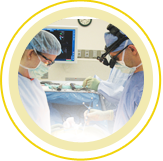New Treatments and Research for Common Spine Problems
As a leader in the treatment of spinal diseases and injury, Spine and Scoliosis is on the cutting edge to explore new treatments for spine problems, such as chronic low back pain, lumbar disc herniation, DDD, pinched nerves, neck pain, radiculopathy, cervical disc herniation, SI joint pain, and spinal stenosis. Exploration in both nonsurgical and surgical treatment for these common spine conditions include new surgical techniques, implants, injections, medications and biologic therapy.
At SSS, we believe that the best medical care for tomorrow can only be developed by studying the care we give today, learning from it, and proposing improvements to it. This is the essence of clinical research. SSS participates in clinical research trials and offers the opportunity for our patients and members of our community to participate in them.
All participation in clinical research is voluntary. Our physicians and clinical trials staff actively search for studies to prevent, detect, diagnose and offer possible treatment to our patients. The majority of studies we offer are nationwide studies involving a large number of participating research centers from across the United States.
Clinical trials are research studies involving human volunteers to answer specific health questions. They are conducted to see if a new drug or device is effective for people to use, compare existing treatments to determine which is better, and they study different ways to use approved treatments, so they will work better, be easier to use, and/or decrease side effects.
Clinical trials are conducted according to a plan that describes what types of patients may enter the study, the types of tests and procedures required, drug dosages, length of study and what outcomes are to be measured at the end of the study. Participants in clinical trials are given informed consent documents to read and review prior to study entry and when changes are made to the protocol. These informed consents are used to ensure that the participant understands the study, its requirements, desired outcome, risks and benefits.



